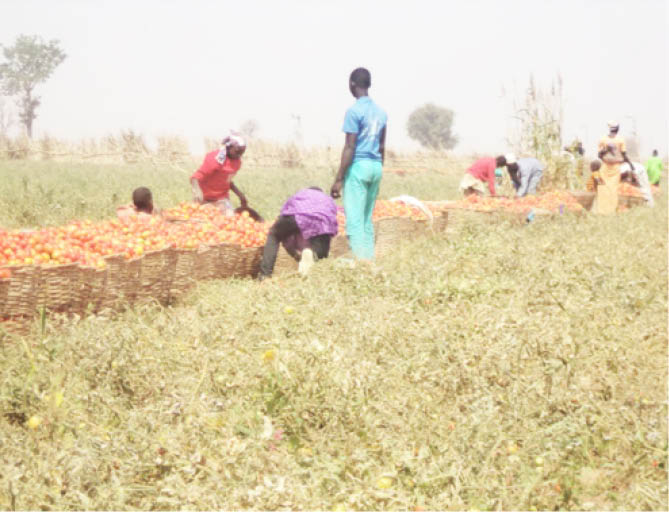Amid water shortage, high price forces massive tomato cultivation
High market demand and rise in the price of tomato has instigated a massive cultivation of the vegetable in Katsina State without due consideration to the source of water to sustain the production throughout the dry season. Over the years, irrigation farmers overstretched the capacities of small dams in Kafur, Danja, Dantankari and Tafoki where […]

High market demand and rise in the price of tomato has instigated a massive cultivation of the vegetable in Katsina State without due consideration to the source of water to sustain the production throughout the dry season.
Over the years, irrigation farmers overstretched the capacities of small dams in Kafur, Danja, Dantankari and Tafoki where large scale production of tomato was taking place yearly.
Alhaji Nasiru Dantankari, a tomato farmer in Dandume LGA said even before the recent scramble in its production, they suffered shortage of water at the tail end of their production yearly.
“Our major sources of water are tube wells dug in our farms as our dam is not more than a pond as far as irrigation farming is concerned.
“Recent high cost of the produce has stimulated many people to cultivate it, especially with the anticipation of its escalating price in Ramadan and Sallah periods; a situation that puts more pressure on our sources of water.” said Nasiru Dantankari.
He added that there was no well thought – out plan on how to source water for the sustenance of the production throughout the season.
“Conventionally, our dam dries up at the end of March, then we resort to tube wells, which will only sustain us to April, but this year because of the massive cultivation of the crop some of our tube wells are already exhausted; and we have no alternative to take care of the young tomato plantation in our farms.”
Dantankari called on government to consider the rapid revolution taking place in the irrigation sector and construct or rehabilitate small dams as the case may be to contain the growing activities in the sector.
Sani Sule, a tomato farmer in Bakori LGA, said the problem was much more on the riverside where no rules govern the use of the water for irrigation.
“Because of the saturation of our irrigation dam, many of us take advantage of Jare dam for our farming but this year, we have overstretched its capacity right from February. The future is bleak for the crop just planted as the river water is fast drying up,” he said.
He added that most farmers were targeting Ramadan and Sallah periods when tomato is scarce and costly in the markets.
Daily Trust discovered that the price of the big basket of the produce has reached N5,200 at the farms and dealers from far away Lagos, Ibadan and Port Harcourt were calling farmers to seal deals for supply of the produce in their respective markets.
Sani Shu’aibu, a farmer said they were now hot cake to dealers in Lagos, Port Harcourt and Ibadan markets, who scramble for farmers to keep the supply chain in this period of high demand.
“With this development, one can predict that in the near future irrigation farming will equal wet season farming in this area as every year newcomers are finding their way into it,” Shu’aibu added.
Malam Ahmed Saleh, an expert in irrigation farming, called on farmers to form cooperatives so that they can sink solar boreholes in their farms to sustain their production.
“We should not sit back and wait for government for everything, especially on emergency issues like this one. We are the farmers, the major beneficiaries of the tomato production therefore, we should form cooperative societies and sink solar boreholes in our farms along the riverside’s,’’ he said.
Ahmed Saleh added that the danger was that most irrigation farmers this year will experience hardship as their sources of water will soon be exhausted.
